
A tennis court is the venue where the sport of tennis is played. It is a firm rectangular surface with a low net stretched across the centre. The same surface can be used to play both doubles and singles matches. A variety of surfaces can be used to create a tennis court, each with its own characteristics which affect the playing style of the game.

Leaves of Grass is a poetry collection by American poet Walt Whitman. Though it was first published in 1855, Whitman spent most of his professional life writing, rewriting, and expanding Leaves of Grass until his death in 1892. Six or nine individual editions of Leaves of Grass were produced, depending on how they are distinguished. This resulted in vastly different editions over four decades. The first edition was a small book of twelve poems, and the last was a compilation of over 400.

Poa pratensis, commonly known as Kentucky bluegrass, smooth meadow-grass, or common meadow-grass, is a perennial species of grass native to practically all of Europe, North Asia and the mountains of Algeria and Morocco. It is a common and incredibly popular lawn grass in North America with the species being spread over all of the cool, humid parts of the United States, despite the fact that it is not native to North America. The Spanish Empire brought the seeds of Kentucky bluegrass to the New World in mixtures with other grasses. In its native range, Poa pratensis forms a valuable pasture plant, characteristic of well-drained, fertile soil. It is also used for making lawns in parks and gardens and has established itself as a common invasive weed across cool moist temperate climates like the Pacific Northwest and the Northeastern United States. When found on native grasslands in Canada, for example, it is considered an unwelcome exotic plant, and is indicative of a disturbed and degraded landscape.
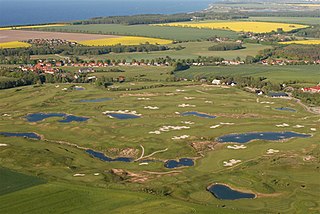
A golf course is the grounds on which the sport of golf is played. It consists of a series of holes, each consisting of a tee box, a fairway, the rough and other hazards, and a green with a cylindrical hole in the ground, known as a "cup". The cup holds a flagstick, known as a "pin". A standard round of golf consists of 18 holes, and as such most courses contain 18 distinct holes; however, there are many 9-hole courses and some that have holes with shared fairways or greens. There are also courses with a non-standard number of holes, such as 12 or 14.
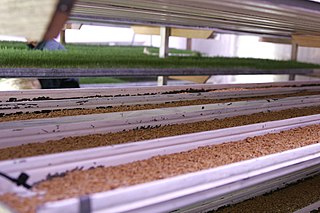
Fodder, also called provender, is any agricultural foodstuff used specifically to feed domesticated livestock, such as cattle, rabbits, sheep, horses, chickens and pigs. "Fodder" refers particularly to food given to the animals, rather than that which they forage for themselves. Fodder includes hay, straw, silage, compressed and pelleted feeds, oils and mixed rations, and sprouted grains and legumes. Most animal feed is from plants, but some manufacturers add ingredients to processed feeds that are of animal origin.
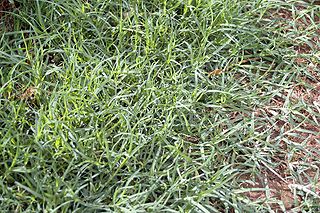
Cynodon dactylon, commonly known as Bermuda grass, is a grass found worldwide. It is native to Europe, Africa, Australia and much of Asia. It has been introduced to the Americas. Contrary to its common name, it is not native to Bermuda and is in fact an abundant invasive species there. In Bermuda it has been known as "crab grass". Other names are Dhoob, dūrvā grass, ethana grass, dubo, dog grass, dog's tooth grass, Bahama grass, crab grass, devil's grass, couch grass, Indian doab, arugampul, grama, wiregrass and scutch grass.

The Green Green Grass is a BBC television sitcom, created and initially written by John Sullivan, and produced by BBC Studios Comedy Productions and Shazam Productions for the BBC. It is a sequel/spin-off of the long-running sitcom Only Fools and Horses and stars John Challis, Sue Holderness, and Jack Doolan. Four series and three Christmas specials were originally broadcast on BBC One between 2005 and 2009.

"Green, Green Grass of Home", written by Claude "Curly" Putman Jr., and first recorded by singer Johnny Darrell in 1965, is a country song made popular by Porter Wagoner the same year, when it reached No. 4 on the Country chart. It was also recorded by Bobby Bare and by Jerry Lee Lewis, who included it in his album Country Songs for City Folks. Tom Jones learned the song from Lewis' version and, in 1966, he had a worldwide No. 1 hit with it.
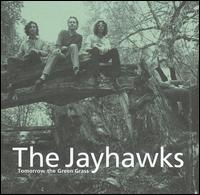
Tomorrow the Green Grass is the fourth studio album by American rock band The Jayhawks, released on February 14, 1995. It peaked at number 92 on the Billboard 200 chart.

Ammophila arenaria is a species of grass in the family Poaceae. It is known by the common names marram grass and European beachgrass. It is one of two species of the genus Ammophila. It is native to the coastlines of Europe and North Africa where it grows in the sands of beach dunes. It is a perennial grass forming stiff, hardy clumps of erect stems up to 1.2 metres (3.9 ft) in height. It grows from a network of thick rhizomes which give it a sturdy anchor in its sand substrate and allow it to spread upward as sand accumulates. These rhizomes can grow laterally by 2 metres in six months. One clump can produce 100 new shoots annually.
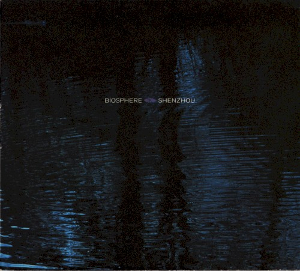
Shenzhou is an album by ambient musician Biosphere released on 3 June 2002. The structure and sound of this album are drastically minimalistic in comparison with Geir Jenssen's previous work, a concept that would be further elaborated upon in the next album. Samples are taken from several of Claude Debussy's orchestral works, particularly La mer and Rondes de printemps. The album's name, "Shenzhou", aside from meaning "magical boat" (神舟) and being the name of the Chinese crewed-spaceflight vehicles, means divine vessel. However, it could also mean "the world" (神州).
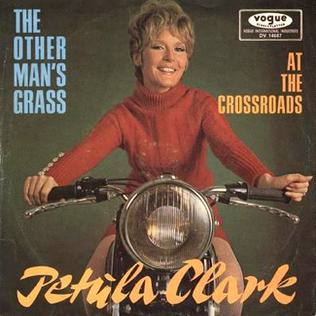
"The Other Man's Grass Is Always Greener" is a song written by Tony Hatch and Jackie Trent which was a 1967-68 hit for Petula Clark.

Love Is a Gentle Thing is an album by Harry Belafonte, released by RCA Victor in 1959. It was recorded with arranger / conductors Alan Greene and Bob Corman.

The first series of The Green Green Grass originally aired between 9 September 2005 and 14 October 2005, beginning with the episode "Keep On Running". A Christmas special aired on 25 December 2005.

The second series of The Green Green Grass originally aired between 15 September 2006 and 27 October 2006, beginning with the episode "Testing Times". A Christmas special aired on 25 December 2006.

The third series of The Green Green Grass originally aired between 2 November 2007 and 21 December 2007, beginning with the episode "But is it Art?". A Christmas special aired on 30 December 2007.

The Other Man's Grass Is Always Greener is the ninth album released by Petula Clark in the United States. It entered the Billboard 200 on February 17, 1968 and remained on the charts for 23 weeks, peaking at #93. It fared better in the United Kingdom, where it reached #37.

On Leaves of Grass is an album composed by John Zorn inspired by the works of Walt Whitman and performed by the Nova Quartet, John Medeski, Kenny Wollesen, Trevor Dunn, and Joey Baron, which was recorded in New York City in March 2014 and released on the Tzadik label. The album is the fourth by the quartet following 2011's Nova Express and At the Gates of Paradise and 2013's Dreamachines.

Bleeders Digest (2015) is the ninth full-length album by Say Hi and was released on September 18, 2015.
"Greener Than the Grass (We Laid On)" is a song written by David Allan Coe, and recorded by American country music artist, Tanya Tucker. It was released in October 1975 and reached positions on the North American country songs charts. It was among Tucker's final singles released by the Columbia label.

















